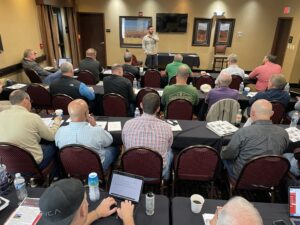
ATLANTA (BP)–Former President Jimmy Carter hosted an informal dialogue on reconciliation with Baptist leaders Nov. 14, including a number of African American and Hispanic Baptist leaders but no Southern Baptist Convention officials.
Carter has been publicly active in seeking to bring about mostly political reconciliation on a world scale since he left the White House as president in 1980. He also has continued teaching Sunday school at a small Baptist church in Plains, Ga., and has authored several books.
A spokesperson at the Carter Center in Atlanta, where the Baptist meeting was held, said no news release was prepared about the meeting.
“It was a private meeting with Baptist leaders that President Carter held to discuss a wide range of issues,” said Carrie Harman of the Carter Center staff.
Two Southern Baptist leaders were at the meeting but an SBC agency head who was invited declined the invitation. James T. Draper Jr., president of the Sunday School Board, received an invitation to the meeting but declined, apparently in part because no other SBC leadership was invited. He also told Baptist Press the Carter meeting came during the time of his executive management group retreat which had been planned for months and could not be changed on short notice.
“In my letter (to Carter) I registered my concern that representation at the meeting would be broader than Southern Baptists since I understood the main purpose was reconciliation in SBC life,” Draper said. “I also expressed concern that other current leaders of the SBC were not invited to attend. I admire Jimmy Carter and always am in favor of finding ways to work together.”
Timothy George, dean of Samford University’s Beeson Divinity School in Birmingham, Ala., and Jim Henry, pastor of First Baptist Church, Orlando, Fla., and a past SBC president, did attend. Prior to the meeting, neither said they knew who else was invited.
“It was a meeting convened by President Carter out of his interest in reconciliation. It included a number of Baptist leaders of various denominations and types, not all Southern Baptist-related,” George told Baptist Press. He said he could not identify the rest of the participants; “the one thing they would like me not to divulge is a list of the people who were there.”
Baptist Press learned that a number of African American and Hispanic Baptist leaders were at the meeting as well as Daniel Vestal, coordinator of the Cooperative Baptist Fellowship. Carter has publicly aligned himself with the CBF. The CBF is a six-year- old group of moderate Baptists critical of SBC leadership.
“It was basically a brainstorming session,” George said of the meeting with Carter. “I think he wanted to share something of his vision. He read Scripture. He led us in prayer. That’s how it opened. And then we went around the table and shared some of our own ideas and thoughts with one another.”
George said he had no idea who would be there but accepted the invitation “partly out of my respect for him and also because I thought it was the Christlike thing to do.”
Both George and Henry said participants spent a lot of time talking about racial reconciliation.
“There were white and African American Baptists at this meeting and that (racial reconciliation) was brought to the table by a number of different people,” George said. Reference was made to the SBC resolution of the subject passed two years ago at the convention’s sesquicentennial meeting in Atlanta.
“This is an issue, in other words, that people felt there was a lot of common concern about,” George said. President Carter would interact “every now and then with his own ideas or thoughts or ask questions for clarification.”
Henry appreciated that no critical remarks were made about other Baptists.
“It was not a meeting to try to criticize anybody in the group,” Henry told Baptist Press. Carter made it clear in his opening remarks, that the meeting was not to correct anything in the past or to criticize anyone, but to look to the future, Henry said.
He said its focus was “to help us look ahead and to talk with each other, and I knew that was a wide bridge because there were different races represented, so it wasn’t just Southern Baptist and CBF. It was African American, it was Hispanic. I saw (Carter) reaching across the Baptist family.”
The meeting lasted about five hours, Henry said, with about 10 or 15 minutes on the SBC-CBF conflict. Henry said he hoped, if there are future meetings, there would be a wider SBC-leadership representation.
George said he mentioned three things in his remarks: the process of dialogue was a good one; that some kind of structure or intentional conversation might continue on a number of different levels; and there was a need to draw in different kinds of Baptist leaders other that those present at the meeting. George said he also hoped for a wider circle of SBC leadership, “if we’re really serious about this process.”
George said he did not think the meeting was CBF-sponsored or –instigated. “And, in fact, I think it was not,” he said.
Regarding Carter’s CBF position, George said Carter is “not seen by many Southern Baptists as a neutral broker in the SBC controversy. … At the same time, he also says he’s a loyal Southern Baptist and he belongs to a church, I understand, that is not a CBF church.” George suggested calling other people together for further discussions, like Billy Graham and Chuck Colson, both high-profile Southern Baptists, who are “held in a wide measure of respect across a broad spectrum.”
George said he didn’t know for certain whether future meetings will take place.
“President Carter expressed the desire to do so. Now, whether that comes about or how it will come about or who will be invited, I don’t know,” George said. “Nothing strategic, really, came out of (the meeting), except a number of ideas that the people who were there had and shared with one another, and one of my ideas was that we needed to involve more conservative Southern Baptists than were present at the meeting.”
Art Toalston contributed to this story.













